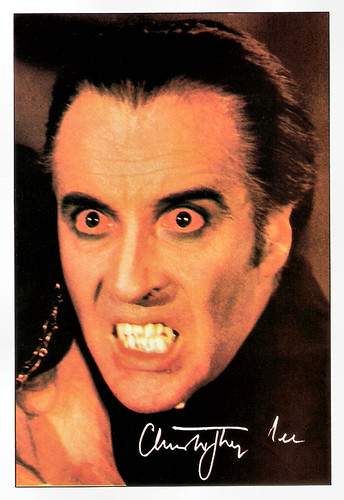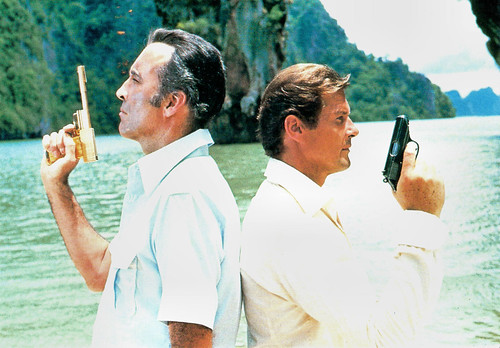Yesterday, it was announced that Christopher Lee died on 7 June 2015. The British film actor is best known as Count Dracula, the bloodsucking vampire. But he created more unforgettable characters on screen, like Francisco Scaramanga in the James Bond film The Man with the Golden Gun (1974), Count Dooku in Star Wars: Episode II - Attack of the Clones (2002), Saruman in The Lord of the Rings film trilogy (2001–2003) and The Hobbit film trilogy (2012–2014), and the title figure in the Hammer Horror film The Mummy (1959). Lee has acted in nearly 230 films in a career spanning nearly 70 years.

German autograph card by Bravo. Photo: Christopher Lee as Dracula.

Vintage postcard, no. 743. Photo: Christopher Lee as Count Dooku in Star Wars: Episode II - Attack of the Clones (George Lucas, 2002).
Sir Christopher Frank Carandini Lee was born in 1922 in London, England. He came from an acting dynasty. His great-grandparents founded the first Australian opera company. His parents were Contessa Estelle Marie (Carandini di Sarzano) and Geoffrey Trollope Lee, a professional soldier. They divorced in 1926.
Later, while Lee was still a child, his mother married (and later divorced) the banker Harcourt George St.-Croix. After attending Wellington College from age 14 to 17, Lee worked as an office clerk in a couple of London shipping companies until 1941, when he enlisted in the Royal Air Force during World War II.
Following his release from military service, Lee joined the Rank Organisation in 1947, training as an actor in their Charm School and playing several bit parts in such films as the Gothic romance Corridor of Mirrors (Terence Young, 1948) with Eric Portman.
He made a brief appearance as a spear carrier in Laurence Olivier's Hamlet (1948). A few years later, he appeared in Captain Horatio Hornblower R.N. (Raoul Walsh, 1951) as a Spanish captain.
Lee had numerous parts in film and television throughout the 1950s. He also dubbed foreign films into English, including Jacques Tati's Les Vacances de M. Hulot/Mr. Hulot's Holiday (1953).

Dutch postcard by Loeb Uitgevers BV, Amsterdam, no. 5992109, 1985. Photo: Eon Productions / Gilrose Publications / Danjaq S.A. Publicity still for The Man with the Golden Gun (Guy Hamilton, 1974) with Roger Moore.
Christopher Lee struggled to get work early in his career as a supporting actor because almost all the male stars were shorter than he. However, playing the monster in the Hammer film Frankenstein (Terence Fisher, 1957) proved to be a blessing in disguise. The film was a success and the jumping-off point for Hammer, a small company which had been in production for many years, and now filled the void left by the American majors in the production of the Horror film. Lee was signed on for future roles in Hammer productions. His deeply melodic basso voice, towering height and slender frame were perfect for imposing, menacing villains.
Lee often played contrasting roles with Peter Cushing in the Hammer films. Cushing was often the protagonist and Lee the villain, whether it be Van Helsing and Dracula respectively in Dracula/Horror of Dracula (Terence Fisher, 1958), or John Banning and Kharis the Mummy respectively in The Mummy (Terence Fisher, 1959). Lee continued his role as Dracula in several Hammer sequels throughout the 1960s and into the early 1970s. He also co-starred with Cushing in The Hound of the Baskervilles (Terence Fisher, 1959) and made numerous appearances as Fu Manchu, most notably in the first of the series, The Face of Fu Manchu (Don Sharp, 1965).
He also made many films in other European countries. With his own production company, Charlemagne Productions, Ltd., Lee made Nothing But the Night (Peter Sasdy, 1973) and To the Devil a Daughter (Peter Sykes, 1976) with Richard Widmark and Nastassja Kinski. Lee was tiring of his horror image and tried to widen his appeal by participating in several mainstream films, such as The Private Life of Sherlock Holmes (Billy Wilder, 1970), The Three Musketeers (Richard Lester, 1973), The Four Musketeers (Richard Lester, 1974), and the James Bond film The Man with the Golden Gun (Guy Hamilton, 1974) with Roger Moore.
In the late 1970s, Christopher Lee moved to Hollywood, where he remained a busy actor but made mostly unremarkable film and television appearances, and eventually moved back to England. The beginning of the new millennium relaunched his career to some degree, during which he played Count Dooku in Star Wars: Episode II - Attack of the Clones (George Lucas, 2002) and as Saruman the White in the Lord of the Rings trilogy (Peter Jackson, 2001-2003). Lee played Count Dooku again in Star Wars: Episode III - Revenge of the Sith (George Lucas, 2005) and as Johnny Depp's character's father in the Tim Burton film, Charlie and the Chocolate Factory (2005).
In 2001, he was made a Commander of the Order of the British Empire in recognition of his services to drama. He was created a Knight Bachelor in 2009 in the Queen's Birthday Honours List for his services to drama and charity. In addition, he was made a Commander of the Order of St John in 1997. On 7 June 2015, Christopher Lee died of heart failure in London. He was 93. He had one child, Christina Erika Lee (1963), with his wife Birgit Kroencke Lee (Gitte Lee).
Trailer Dracula/Horror of Dracula (Terence Fisher, 1958). Source: MOVIECLIPS Classic Trailers (YouTube).
Trailer The Wicker Man (Robin Hardy, 1973). Source: MOVIECLIPS Classic Trailers (YouTube).
Trailer The Three Musketeers (Richard Lester, 1973). Source: MOVIECLIPS Classic Trailers (YouTube).
Trailer The Man with the Golden Gun (Guy Hamilton, 1974). Source: MOVIECLIPS Classic Trailers (YouTube).
Sources: Lyn Hammond and Sidhartha Shankar (IMDb), Wikipedia and IMDb.
This post was last updated on 12 March 2025.

German autograph card by Bravo. Photo: Christopher Lee as Dracula.

Vintage postcard, no. 743. Photo: Christopher Lee as Count Dooku in Star Wars: Episode II - Attack of the Clones (George Lucas, 2002).
Charm school
Sir Christopher Frank Carandini Lee was born in 1922 in London, England. He came from an acting dynasty. His great-grandparents founded the first Australian opera company. His parents were Contessa Estelle Marie (Carandini di Sarzano) and Geoffrey Trollope Lee, a professional soldier. They divorced in 1926.
Later, while Lee was still a child, his mother married (and later divorced) the banker Harcourt George St.-Croix. After attending Wellington College from age 14 to 17, Lee worked as an office clerk in a couple of London shipping companies until 1941, when he enlisted in the Royal Air Force during World War II.
Following his release from military service, Lee joined the Rank Organisation in 1947, training as an actor in their Charm School and playing several bit parts in such films as the Gothic romance Corridor of Mirrors (Terence Young, 1948) with Eric Portman.
He made a brief appearance as a spear carrier in Laurence Olivier's Hamlet (1948). A few years later, he appeared in Captain Horatio Hornblower R.N. (Raoul Walsh, 1951) as a Spanish captain.
Lee had numerous parts in film and television throughout the 1950s. He also dubbed foreign films into English, including Jacques Tati's Les Vacances de M. Hulot/Mr. Hulot's Holiday (1953).

Dutch postcard by Loeb Uitgevers BV, Amsterdam, no. 5992109, 1985. Photo: Eon Productions / Gilrose Publications / Danjaq S.A. Publicity still for The Man with the Golden Gun (Guy Hamilton, 1974) with Roger Moore.
A blessing in disguise
Christopher Lee struggled to get work early in his career as a supporting actor because almost all the male stars were shorter than he. However, playing the monster in the Hammer film Frankenstein (Terence Fisher, 1957) proved to be a blessing in disguise. The film was a success and the jumping-off point for Hammer, a small company which had been in production for many years, and now filled the void left by the American majors in the production of the Horror film. Lee was signed on for future roles in Hammer productions. His deeply melodic basso voice, towering height and slender frame were perfect for imposing, menacing villains.
Lee often played contrasting roles with Peter Cushing in the Hammer films. Cushing was often the protagonist and Lee the villain, whether it be Van Helsing and Dracula respectively in Dracula/Horror of Dracula (Terence Fisher, 1958), or John Banning and Kharis the Mummy respectively in The Mummy (Terence Fisher, 1959). Lee continued his role as Dracula in several Hammer sequels throughout the 1960s and into the early 1970s. He also co-starred with Cushing in The Hound of the Baskervilles (Terence Fisher, 1959) and made numerous appearances as Fu Manchu, most notably in the first of the series, The Face of Fu Manchu (Don Sharp, 1965).
He also made many films in other European countries. With his own production company, Charlemagne Productions, Ltd., Lee made Nothing But the Night (Peter Sasdy, 1973) and To the Devil a Daughter (Peter Sykes, 1976) with Richard Widmark and Nastassja Kinski. Lee was tiring of his horror image and tried to widen his appeal by participating in several mainstream films, such as The Private Life of Sherlock Holmes (Billy Wilder, 1970), The Three Musketeers (Richard Lester, 1973), The Four Musketeers (Richard Lester, 1974), and the James Bond film The Man with the Golden Gun (Guy Hamilton, 1974) with Roger Moore.
In the late 1970s, Christopher Lee moved to Hollywood, where he remained a busy actor but made mostly unremarkable film and television appearances, and eventually moved back to England. The beginning of the new millennium relaunched his career to some degree, during which he played Count Dooku in Star Wars: Episode II - Attack of the Clones (George Lucas, 2002) and as Saruman the White in the Lord of the Rings trilogy (Peter Jackson, 2001-2003). Lee played Count Dooku again in Star Wars: Episode III - Revenge of the Sith (George Lucas, 2005) and as Johnny Depp's character's father in the Tim Burton film, Charlie and the Chocolate Factory (2005).
In 2001, he was made a Commander of the Order of the British Empire in recognition of his services to drama. He was created a Knight Bachelor in 2009 in the Queen's Birthday Honours List for his services to drama and charity. In addition, he was made a Commander of the Order of St John in 1997. On 7 June 2015, Christopher Lee died of heart failure in London. He was 93. He had one child, Christina Erika Lee (1963), with his wife Birgit Kroencke Lee (Gitte Lee).
Trailer Dracula/Horror of Dracula (Terence Fisher, 1958). Source: MOVIECLIPS Classic Trailers (YouTube).
Trailer The Wicker Man (Robin Hardy, 1973). Source: MOVIECLIPS Classic Trailers (YouTube).
Trailer The Three Musketeers (Richard Lester, 1973). Source: MOVIECLIPS Classic Trailers (YouTube).
Trailer The Man with the Golden Gun (Guy Hamilton, 1974). Source: MOVIECLIPS Classic Trailers (YouTube).
Sources: Lyn Hammond and Sidhartha Shankar (IMDb), Wikipedia and IMDb.
This post was last updated on 12 March 2025.
4 comments:
Great post! The Man with the Golden Gun is one of my most favorite movies.
Thanks. I loved The Wicker Man too.
Sir Christopher Lee and Peter Cushing are the best actors of there time, I have nearly all there films I miss them quite a bit. so talented 2 men that will go down in cinema history.R I P Christopher and Peter, You shall never be forgotten.
Thanks. Both are missed indeed. I would love to find vintage postcards of Peter Cushing and make a post on him for EFSP one day...
Post a Comment